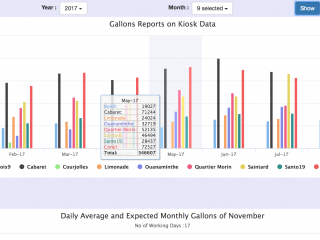Project Results:
Scaling mobile IT for Safe Water Enterprises
A free and open source IT platform for SWEs
About the project
The project aimed to create a free open source IT platform (SEMA) to help Safe Water Enterprises (SWEs) manage, scale and sustain their water business operations in Rwanda and Ghana. The platform can be used for all sorts of data: who purchases water, where they live, how well the water is delivered etc. SWE-owners can save money and time by using a low-cost platform which they can customize to their own business model with specially developed functionalities, instead of starting from scratch.
Key results
- A common open source platform designed and tested for SWE management and operation.
- Development of extra functions and tools for the SEMA platform, made by locally hired IT development firms in Rwanda and Uganda.
- Several studies were completed and shared publicly on the potential impact, scalability and sustainability of an ecosystem for IT for SWE’s.
Tips for the future
-
Creating a common IT platform for SWEs in two countries is challenging, but turned out to be very useful when the feedback on specific needs of the franchising SWEs is directly used in re-designing the platform.
Potential for growth
The SEMA platform is offered as a cost-free open source license. IT providers could develop any desired additional functionality on the platform for licensing or sale by SWEs. Other SWEs have started implementing the SEMA platform and tools in their systems, a.o. in Burkina Faso and Ivory Coast. One of the project partners intend to continue developing SEMA (as public funding allows).
Project partners
Jibu Rwanda, Safe Water Network Ghana, dIoHaiti
Period
January 2017 – December 2018
Location
Kigali, RwandaAccra, Ghana
Last project updates
Background
Safe water enterprises (SWEs ) are an important complement to centralised piped water systems in meeting the needs of base-of-the-pyramid (BoP) populations in Sub Saharan Africa (SSA). The Safe Drinking Water Alliance and the global Dalberg study it sponsored concluded in January 2017 that “the SWE model can be an important component of the solution by complementing or substituting the piped network” in countries lacking infrastructure and experiencing rapid population growth and urbanisation. The study also concludes that greater sector collaboration would be beneficial, and specifically, the creation of a “separate platform as a service business model” could help catalyze the sector.
Much more can be done to catalyze the sector, including kickstarting the development of tools and platforms that otherwise would require significant upfront investment.
Mobile IT is one of these opportunities and is an important piece for scale and replication. Without transparency and manageability of operations, SWEs are limited in geographic scope and scale, and face higher exposure to fraud and abuse. Also, better access to real-time data and interactions with customers can help organisations understand the people they serve, helping increase market penetration, facilitating financial sustainability, and reaching greater scale to serve more people in base-of-the-pyramid communities.
Three operators – dloHaiti, Jibu, and Safe Water Network (SWN) – have agreed to collaborate and integrate an open source platform for mobile IT that facilitates interoperability, sharing of common solutions, and greater systems integration.
Project Plan
**Needs Assessment and Architecture development** Dec 1, 2017 – Jan 31, 2018 Led by Dan Nolan, Technical Manager
**Project Manager starts** Jan 15, 2018 Hiring led by Dan Nolan and Steering Committee
**Implementation Managers in Ghana & Rwanda Start** Jan 31, 2018 Led by Anne Stewart and John Keys
**IT Software Development** Feb 1 – Jul 31, 2018 Rolling release Led by Dan Nolan with IT Development firm, & Implementation Managers
**IT & Data Architecture Framework published online** Mar 15, 2018 Led by Dan Nolan and Steering Committee
**Pilot implementation** April 1 – Sept 30, 2018 Led by Project Manager
**Mid-Project Report** May 31, 2018
**Implementation complete in Ghana & Rwanda** Sept 30, 2018 Led by Project Manager and Technical Manager
**Scalability and sustainability impact study** Oct 1 – Dec 15, 2018 Led by TBH Third Party
**Assessment of learnings** Oct 1 – Dec 15, 2018 Led Project Manager and Technical Manager with Steering Committee
**Study, learnings, and code published online** Dec 15, 2018
Target group
Ultimately, communities lacking reliable and affordable access to clean water are the beneficiaries. SWEs will be able to increase efficiency and scalability of operations, i.e. each SWE would have the capacity and tools to manage hundreds or thousands of sites each instead of a few dozen, and thus serving more people, more efficiently.
Customers and partners for the platform would be Safe Water Enterprises seeking to scale operations, including new entrants and existing operators.
Sustainability
One challenge of open-source software is ensuring that a sufficiently large and self-sufficient community exists to apply and improve open-source code over time. A critical mass of users is required to support a self-sustaining ecosystem of implementers and developers.
The consortium believes that it is possible to create a self-sustaining ecosystem of service providers offering ongoing consulting, technical development, and support services focused on the mobile IT platform. The ending scalability and sustainability study will provide recommendations and financial analysis on possible sustainability scenarios for an emerging open-source community and IT ecosystem.
Overview of Goals
a) Save SWEs money and time in implementing mobile IT by providing a low-cost platform which any water operator can use to adapt to their own business model, instead of starting from scratch.
b) Help create an ecosystem of IT vendors, implementers, and SWE users who benefit from having a larger market and more options. A standards-based approach means that less development is duplicated and more tools can be shared.
